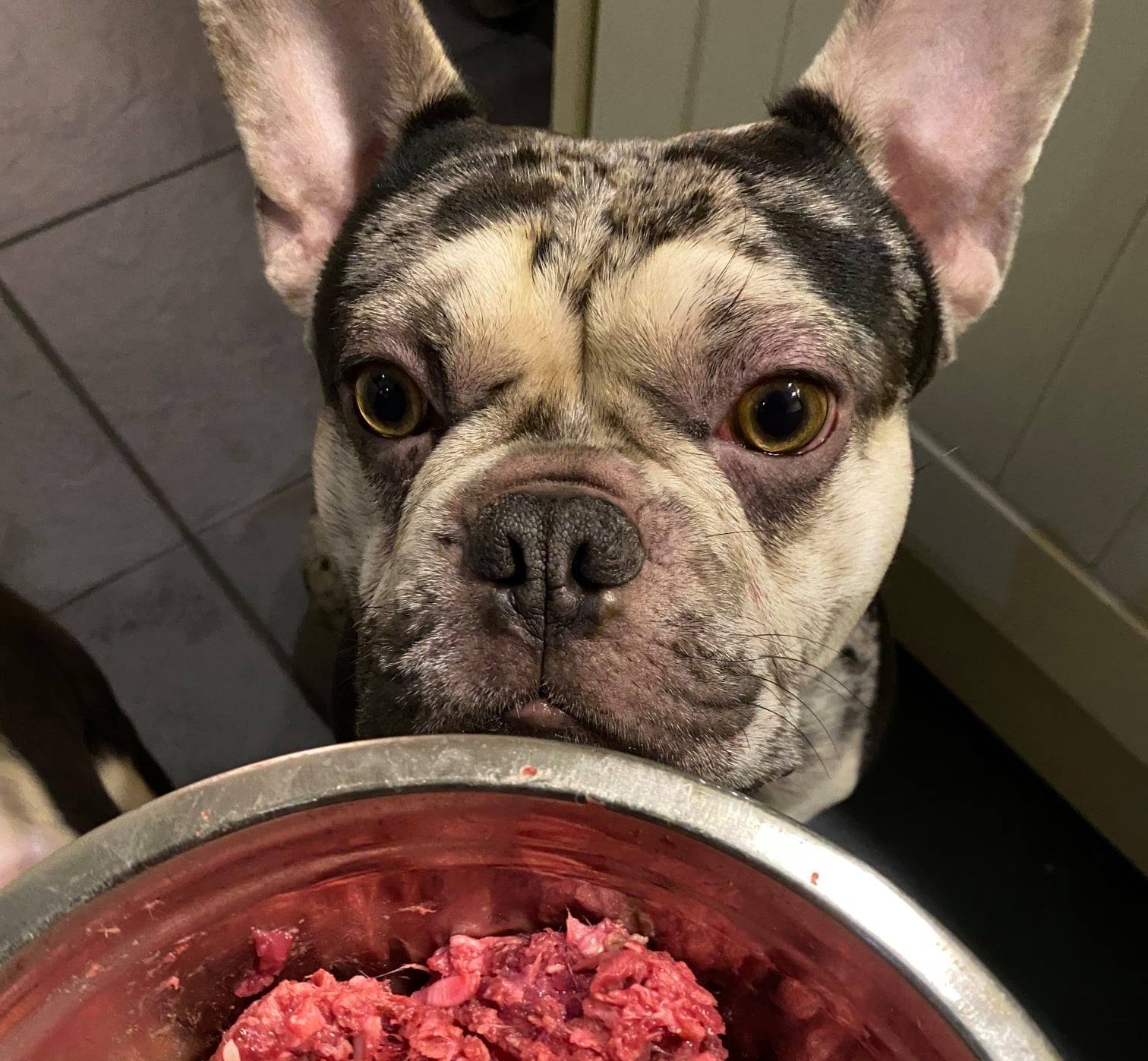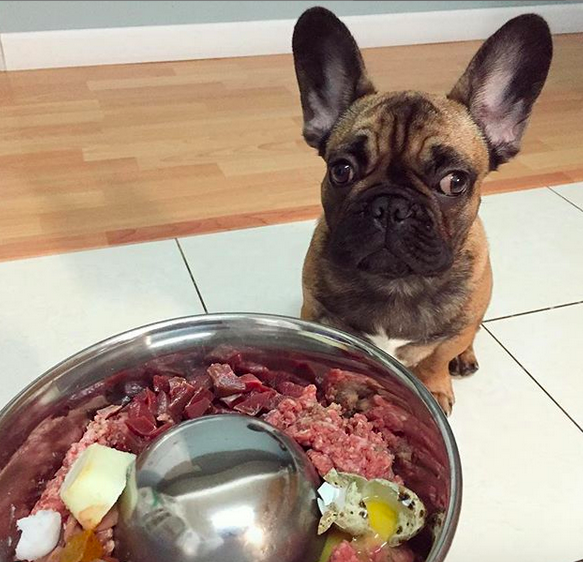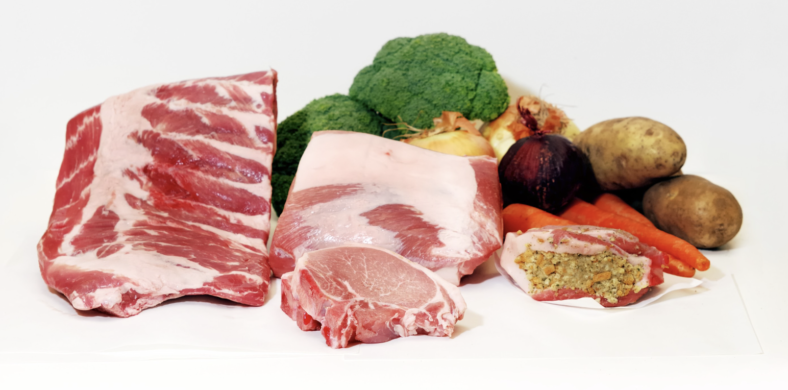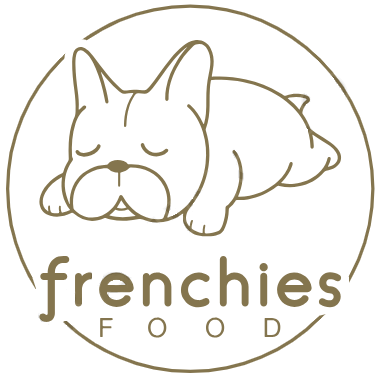
Introduction to french bulldog raw diet
Recently, there has been an increasing popularity in feeding french bulldog raw diet , attracting the interest of numerous dog owners. This approach emphasizes giving your pet unprocessed, natural foods that resemble what their ancestors would have eaten in the wild. Proponents of the raw diet for French Bulldogs believe it can improve your Frenchie’s health and behavior, pointing out various advantages it may offer.
Benefits of a french bulldog raw diet
Health Benefits
- Enhances Skin and Fur Health:Many owners of French Bulldogs have noticed that their pets have shinier fur and healthier skin after transitioning to a raw diet specifically designed for French Bulldogs. This is likely because raw foods contain natural oils and superior nutrients.
- Enhanced Digestion: Raw diets can boost digestion and minimize problems like bloating and gas, as they do not contain fillers or artificial additives.
- Boosted Energy Levels: By reducing processed carbohydrates and increasing protein intake, your French Bulldog is expected to have increased energy levels and improved overall vitality.
Nutritional Benefits
- Vital Nutrients: A raw diet for French bulldogs can supply important nutrients that are typically removed during the production of commercial dog foods, such as vitamins, minerals, and amino acids.
- Proper Nutrition: A carefully designed raw diet guarantees that your dog receives a well-rounded combination of proteins, fats, and carbohydrates, which is essential for their overall well-being.
Physiological Benefits
- Improved Dental Health: Giving your French Bulldog raw bones to chew on can naturally help keep their teeth clean, decreasing the accumulation of plaque and lowering the chances of gum disease.
- Lowered Disease Risk: Feeding your French Bulldog a raw diet can enhance their immune system and decrease the likelihood of common illnesses due to the nutritious, unrefined components.
Key Ingredients in a French Bulldog raw diet

Meat
- Recommended Meat Options: Good options include chicken, beef, lamb, and turkey. It’s important to use fresh meat that is antibiotic and hormone-free.
- Preparation: Before feeding your Frenchie, always check the meat for small bones that could pose a choking risk. Cut the meat into smaller, easy-to-eat pieces for your dog.
Bones
- Safe Bones: Select bones from poultry such as chicken necks or turkey wings, which are not weight-bearing. It is important to avoid cooked bones because they can break into sharp pieces and harm your pet internally.
- Selecting the Right Bones: Pick bones that are big enough so they cannot be swallowed whole, yet small enough for your dog to chew on comfortably.
Organs
- Significance: It is important to include nutrient-rich organs such as liver, kidney, and heart in your dog’s diet, making up approximately 10% of
Raw Food Diet Recipes for French Bulldogs
Below are some Raw Food Diet recipes that are appropriate for French Bulldogs:
Raw Beef and Vegetable Mix
Ingredients:
- Freshly ground beef
- Fresh vegetables like carrots, pumpkin, and broccoli
- A small amount of fish oil or coconut oil
Directions:
- Combine the ground beef with finely diced vegetables.
- Incorporate a small amount of fish oil or coconut oil to provide essential fatty acids.
- Make sure all ingredients are well combined.
- Divide the mixture into small portions and refrigerate for storage.
Raw Chicken and Vegetable Medley
Ingredients:
- Ground fresh chicken (including meat, liver, neck, and bones)
- Assorted vegetables such as pumpkin, leafy greens, and root vegetables
- Optional addition of raw egg
- Fish oil or coconut oil for extra nutrients
Instructions:
- Combine ground fresh chicken with a variety of vegetables.
- If preferred, incorporate a small amount of raw egg.
- Enhance nutritional value by including a touch of fish oil or coconut oil.
- Thoroughly mix the ingredients and divide into individual portions for storage.
Raw Turkey and Vegetable Blend
Ingredients:
- Ground turkey (comprising meat and organs)
- Assorted vegetables like zucchini, spinach, and celery
- A dash of raw apple cider vinegar (if desired)
Directions:
- Mix together the ground turkey and finely diced vegetables.
- If preferred, include a small quantity of raw apple cider vinegar for aiding digestion.
- Blend well to evenly distribute all components.
- Separate into suitable servings and store in the refrigerator.
Raw Fish and Veggie Delight
Ingredients:
- Fresh boneless fish (e.g. salmon or mackerel), finely chopped
- Various vegetables like sweet potatoes, peas, and kale
- A dash of ground flaxseed or chia seeds for omega-3 fatty acids
Instructions:
- Finely chop the boneless fish and combine with finely chopped vegetables.
- Sprinkle ground flaxseed or chia seeds on top for extra nutrients.
- Thoroughly mix all ingredients to ensure even distribution.
- Divide into smaller portions and refrigerate until ready to serve.
Note:

- Food safety: Always use fresh and clean ingredients for your French Bulldog’s meals.
- Nutritional balance: Ensure that the menu includes a good balance of nutrients such as protein, fats, and essential minerals.
- Variety: Rotate different food items to provide a diverse range of nutrients for your French Bulldog.
- Supplements: Consider including calcium supplements or bone meal in the diet if whole bones are not being fed to support bone health.
- Monitoring: Regularly monitor your French Bulldog’s health and make any necessary adjustments to their diet with guidance from a veterinarian.
- Veterinary advice: Seek advice from a vet before transitioning your French Bulldog to a fully raw diet to ensure it is suitable for their overall health.
Starting with the french bulldog raw diet
Transitioning to a Raw Food Diet
- Gradual Transition: To start incorporating raw food into your French Bulldog’s diet, slowly introduce small amounts mixed with their regular food. Increase the raw portion gradually over 7-10 days.
- Monitor Their Health: Keep a close watch on your dog’s well-being as you transition their diet. Look out for any signs of digestive issues like vomiting or diarrhea, and adjust the feeding plan accordingly.
- Balanced Meals: Make sure each meal includes a balanced combination of meat, bones, and organs to provide essential nutrients. Seek advice from your veterinarian to customize the diet according to your dog’s specific requirements.
Storing and Handling Raw Food
- Correct Storage: Keep raw food in sealed containers and store it in the refrigerator or freezer to keep it fresh and prevent bacteria from growing.
- Hygiene: Make sure to wash your hands, utensils, and cooking surfaces properly after dealing with raw food to prevent any contamination.
- Meal Portions: Adjust meal sizes based on your French Bulldog’s dietary requirements. Preparing meals in advance can be a time-saving and convenient way to feed your pet.
Consulting with a Veterinarian
- Expert Advice: It is recommended to seek advice from your vet before transitioning your French Bulldog to a raw diet. Vets can offer important information on appropriate portion sizes and ensuring a balanced diet.
- Routine Veterinary Visits: Make sure to schedule regular check-ups to keep track of your dog’s well-being and make any needed changes to their diet. Regular blood tests can help confirm that your dog is getting all the necessary nutrients.
Notes and Limitations

Potential Risks
- Presence of Harmful Bacteria in Raw Food: Raw food may contain dangerous bacteria like Salmonella and E. coli, which can result in severe sickness for both dogs and humans. It’s crucial to get ingredients from trustworthy sources and follow proper food safety practices to reduce the chances of contamination.
- Lack of Nutritional Balance: If not carefully planned, a raw diet could be deficient or excessive in essential nutrients, potentially harming your dog. Seeking guidance from a veterinarian or pet nutrition specialist can help ensure the diet meets all nutritional needs.
- Risks Associated with Feeding Bones: Giving bones, even raw ones, can lead to issues such as broken teeth, choking, or blockages in the digestive system. It’s important to supervise your dog while they eat bones and select appropriate types and sizes to prevent these risks.
Cost and Accessibility
- Cost: Raw diets can be more expensive than commercial dog foods because of the higher cost of quality meats, organs, and bones. This can be a significant factor for pet owners with limited budgets.
- Ingredient Availability: The availability of fresh, high-quality raw ingredients may be restricted depending on where you live. While sourcing from local farmers or trusted suppliers is ideal, it may not always be practical.
- Time Requirement: Preparing raw meals can be time-intensive, requiring careful planning, storage, and hygiene practices. Pet owners should be ready to dedicate the necessary time and effort to maintain this kind of diet.
Special Dietary Needs
- Age and Health Conditions: Different age groups and health conditions in dogs may necessitate specific dietary adjustments. For instance, puppies require more calories and nutrients for growth, while senior dogs may need modifications for issues like arthritis or kidney problems. It’s important to seek guidance from a vet to customize the raw diet according to your dog’s life stage and health condition.
- Weight Management: Raw diets often contain high levels of fat, which can contribute to weight gain if not monitored carefully. Regularly monitoring your French Bulldog’s weight and adjusting portion sizes are essential for keeping them at a healthy weight.
Owner Commitment
- Consistency is crucial: To succeed with a raw diet for dogs, it is important to consistently put in effort. Unlike commercial dog food that is formulated to provide all necessary nutrients, a raw diet requires careful planning for each meal to make sure the dog gets all the needed nutrition.
- Learning and Support: Dog owners need to educate themselves about dog nutrition and keep informed about the latest research and recommendations. Being part of raw feeding groups or seeking advice from professionals can offer helpful guidance and knowledge.
Environmental Impact
- Environmental Sustainability: The production of meat, especially from factory farming methods, can cause notable harm to the environment through carbon emissions and excessive use of resources. Opt for environmentally friendly choices like organic or ethically sourced meats to lessen the environmental impact.
- Effective Waste Disposal: It is essential to dispose of raw food waste, like leftover bones and uneaten food, properly to avoid attracting pests and to uphold cleanliness standards.
Frequently Asked Questions
Q : Which is better for French bulldogs, French bulldog food recipes or French bulldog raw diet?
A : The decision on whether to feed homemade dog food for frenchies or a raw diet depends on the nutritional value, the dog’s personal preferences, and the owner’s capability to prepare and offer a proper diet.
Q : Is it possible to combine raw diet and dry food for French Bulldogs?
A : It is possible to mix raw diet with the best dry dog food for french bulldogs , but it is important to ensure that both types of food provide proper nutrition and are compatible in the dog’s digestive system.
Q : Is a raw diet the best food for French Bulldogs?
A : Is a raw diet the best food for french bulldog ? There’s no definitive answer, as it depends on various factors including the dog’s health, dietary needs, and veterinary advice.
Q : What is the Raw diet and what benefits does it have for the French Bulldog?
A : A raw diet consists of uncooked or minimally processed foods like fresh meat, bones, and vegetables. This type of diet can offer natural nutrients and overall health benefits for French Bulldogs.
Q : What can Frenchies not eat?
A : French Bulldog owners often ask: What can Frenchies not eat ? It is important to avoid feeding Frenchies chocolate, grapes, raisins, onions, garlic, caffeine, and alcohol, as these can be toxic to them.
Conclusion
Transitioning your French Bulldog raw diet can bring various advantages, such as enhanced well-being, digestion, and vitality. Nevertheless, it’s important to seek advice from your vet before altering their diet to guarantee it’s suitable for your pet. Interested in getting started? You may want to schedule an appointment with a veterinary nutritionist to create a customized raw diet plan that suits your Frenchie perfectly.
